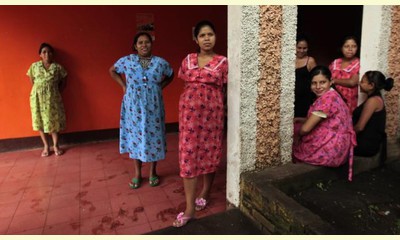|
|
World must focus on younger girls to eradicate teen pregnancy - report
an article by Thomson Reuters Foundation (abridged)
Governments and the international community need
to rethink their efforts to tackle teenage
pregnancy and improve their response to the
specific needs of girls under 15, the most
neglected and most at risk group, according to a
report released on Wednesday. In this year’s
State of the World Population report, the United
Nations Population Fund (UNFPA) said some 20,000
girls under the age of 18 give birth every day in
developing countries, nine out of 10 in a marriage
or union.

Pregnant teenagers stand at the entrance of a maternity home in Jinotega city, some 160 km (100 miles) north of Managua October 24, 2013. REUTERS/Oswaldo Rivas
click on photo to enlarge
“It is the human right of a girl not to become
pregnant as a child,” Dr. Laura Laski, head of
sexual and reproductive health at UNFPA, told
Thomson Reuters Foundation in a telephone
interview from New York. Teenage pregnancy
perpetuates poverty and can put the health and
life of teenage girls at risk, Laski said.
Every year, 7.3 million adolescent girls give
birth in developing countries, 2 million of them
under the age of 15, according to UNFPA. The
number of pregnancies is even higher and about
70,000 adolescents die every year in the
developing world of childbirth-related causes -
about 200 a day.
Even though most adolescent pregnancies occur in
developing countries, the determinant factors are
the same in both the developed and developing
world, the report said. Poor, uneducated girls
from rural areas are more at risk of pregnancy
than their wealthier urban counterparts and,
despite a global commitment to end harmful
cultural traditions such as child marriage, one in
three girls in developing countries is married
before she turns 18, the report said. . . .
Adolescent mothers are often powerless victims of
a vicious cycle. They become pregnant because they
are poor, uneducated and belong to communities
where they are often forced into marriage and
prevented from getting an education that would
enable them to break the cycle. In many cases,
adolescent girls get pregnant because they have
been sexually abused or coerced into having
intercourse by their peers, community, sometimes
their family.
The report called for a shift from targeted
interventions to a more far-reaching strategy that
“builds girls’ human capital, helps them make
decisions about their lives and offers them real
opportunities so that motherhood is not seen as
their only destiny” . . .
When a young teenager gets pregnant it also means
they are less likely to finish high school, making
it harder to get a job and break the cycle of
poverty that many young mothers in Latin America and
in other parts of the world face. . .
One key way of preventing teenage pregnancy is to
ensure girls stay in school and do not drop out at
an early age, while providing better and more
widespread sex education in schools to young girls
and boys and improving access to birth control
methods.
[Note: Thank you to Janet Hudgins, the CPNN reporter
for this article.]
|








|
DISCUSSION
Question(s) related to this article:
What other resources can be utilized to give women more opportunities?,
* * * * *
LATEST READER COMMENT:
On their website, the United Nations Population Fund makes it clear that lack of access to family planning is a form of violence against women.
"Gender-based violence both reflects and reinforces inequities between men and women and compromises the health, dignity, security and autonomy of its victims. It encompasses a wide range of human rights violations, including sexual abuse of children, rape, domestic violence, sexual assault and harassment, trafficking of women and girls and several harmful traditional practices. Any one of these abuses can leave deep psychological scars, damage the health of women and girls in general, including their reproductive and sexual health, and in some instances, results in death.
Violence against women has been called "the most pervasive yet least recognized human rights abuse in the world." Accordingly, the Vienna Human Rights Conference and the Fourth World Conference on Women gave priority to this issue, which jeopardizes women's lives, bodies, psychological integrity and freedom. Violence may have profound effects – direct and indirect – on a woman's reproductive health, including:
Unwanted pregnancies and restricted access to family planning information and contraceptives
Unsafe abortion or injuries sustained during a legal abortion after an unwanted pregnancy
Complications from frequent, high-risk pregnancies and lack of follow-up care
Sexually transmitted infections, including HIV
Persistent gynaecological problems
Psychological problems
Gender-based violence also serves – by intention or effect – to perpetuate male power and control. It is sustained by a culture of silence and denial of the seriousness of the health consequences of abuse. In addition to the harm they exact on the individual level, these consequences also exact a social toll and place a heavy and unnecessary burden on health services.
UNFPA recognizes that violence against women is inextricably linked to gender-based inequalities. When women and girls are expected to be generally subservient, their behaviour in relation to their health, including reproductive health, is negatively affected at all stages of the life cycle.
UNFPA puts every effort into breaking the silence and ensuring that the voices of women are heard. At the same time, the Fund works to change the paradigm of masculinity that allows for the resolution of conflict through violence. . ...more.

|
|









